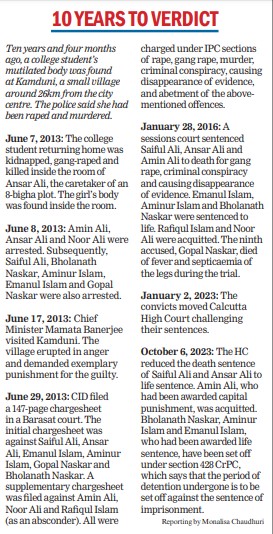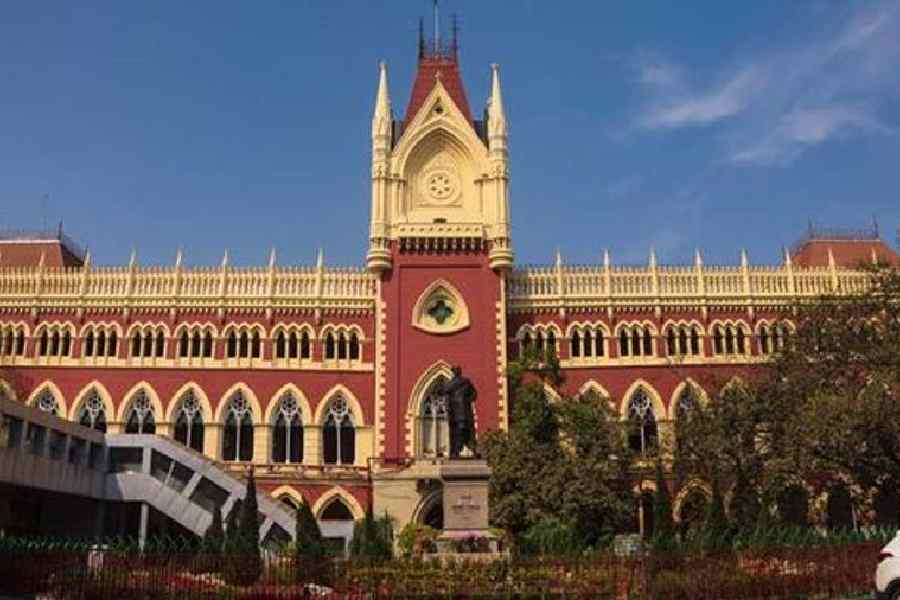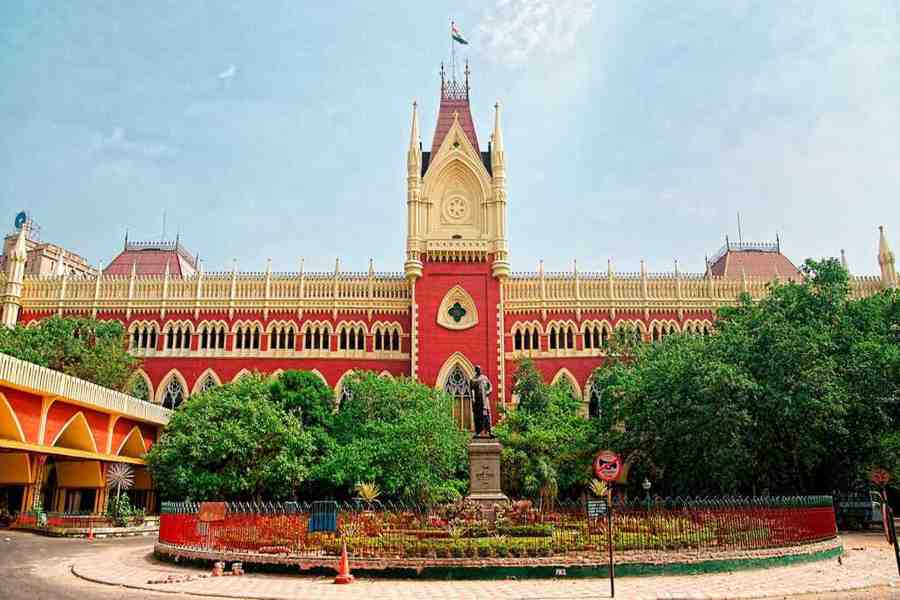Calcutta High Court on Friday delivered the long-awaited judgment on the rape and murder of a 19-year-old woman in Kamduni village, commuting the death sentences of two accused, acquitting a third death-row convict, and reducing the life terms of three convicts to seven years.
The family and friends of the woman, whose murder had shaken Bengal 10 years ago, reacted to the verdict with dismay.
Ansar Ali and Saiful Ali had their death sentences — awarded in 2016 by a sessions court — transmuted to life sentences. Amin Ali, also sentenced to death, was acquitted of all charges.
The other three accused — Bholanath Naskar, Emanul Islam and Aminur Islam — had their life sentences reduced to seven years. Since they have already been jailed for 10 years, they can now walk free on the payment of a fine.
Tumpa Koyal, a childhood friend of the victim, said a team of three CID officials had visited Kamduni and spoken to her, Moushumi Koyal and the victim’s family, telling them the state government was by their side and would appeal in the Supreme Court. Tumpa and Moushumi had become the face of the “Kamduni movement” that sought justice for the victim after the 2013 atrocity.
The bench of Justices Joymalya Bagchi and Ajay Kumar Gupta convicted Ansar and Saiful under IPC sections 376A, 376D, 302, 120B and 201 of rape, murder, criminal conspiracy and destruction of evidence. Emanul, Aminur and Naskar have been acquitted of rape charges but held guilty of criminal conspiracy and destruction of evidence.
The court judgment said: “In the light of the aforesaid circumstances, I am
of the opinion the trial Court erred in awarding death penalty with reference to the gravity of the offence alone. State has failed to prove conspiracy and prior concert in the crime beyond reasonable doubt. It has also not led evidence to rebut the possibility of reformation and rehabilitation.”

The judgment added: “On the other hand, conduct of the appellants in the correctional home is satisfactory and other unrebutted materials before this Court gives rise to a reasonable belief that there is high possibility of reformation and rehabilitation of the appellants.
“Alternative punishment of life imprisonment for the remainder of natural life is a more humane substitute that adequately addresses societal concerns of recidivism....”
The victim’s family and friends, who had come to the court from Kamduni, about 20km from Calcutta, broke down after hearing the verdict.
“We had hoped that the high court would uphold the lower court verdict,” said Tumpa, who now lives in another place with her husband’s family. “We had somehow managed to keep up our struggle.”
On June 7, 2013, the murdered girl, a college student and a first-generation learner, was returning home in the afternoon from college when she was grabbed and taken into an enclosure after she had just turned into her village road. She was raped and murdered.
Her mauled body was found later on the other side of the boundary wall.
The village had erupted in anger at the sight of the girl’s body, which was torn down the middle till the navel. The whole of Kamduni had come together to protest the teen’s death, calling her their “daughter”.
When chief minister Mamata Banerjee paid a belated visit to the village, Tumpa, at the head of a crowd that had marched to confront her, had asked her to stop speaking and listen to the villagers.
Tumpa, Moushumi and Pradip Mukherjee, a schoolteacher, formed the Kamduni Pratibadi Mancha and led the movement for justice for the murdered girl. All along, they said, they faced dire threats from people in power.
They alleged that the investigating agencies, the police and the CID were trying to protect the guilty.
After the verdict on Friday, the lawyer for the victim’s family expressed his disappointment in strong words.
“The state government had wanted the guilty not to be punished. The investigating agencies, the state police and the CID had destroyed evidence,” said Jayanta Narayan Chattopadhyay, the lawyer. “A brutal rape and murder has been reduced to an ordinary crime.”
He added: “Since the case moved to the high court — after the accused appealed — 14 state advocates working for the prosecution resigned. This is extraordinary. They were either intimidated or lured away.”
The case also faced long delays, he said. “Even the post-mortem was doctored. It did not mention that her body was torn down the middle. It also glossed over all the brutalities,” he said.
“We are afraid of a backlash now,” Tumpa said after the verdict. “We have fought despite little money and threats. A bomb was hurled at my house once.”
She added: “We had hoped the police and the state would do their job to punish the guilty.”
Moushumi said: “But we will not give up. We will go to the Supreme Court.”
She said a protest was being planned in Kamduni on Saturday.











